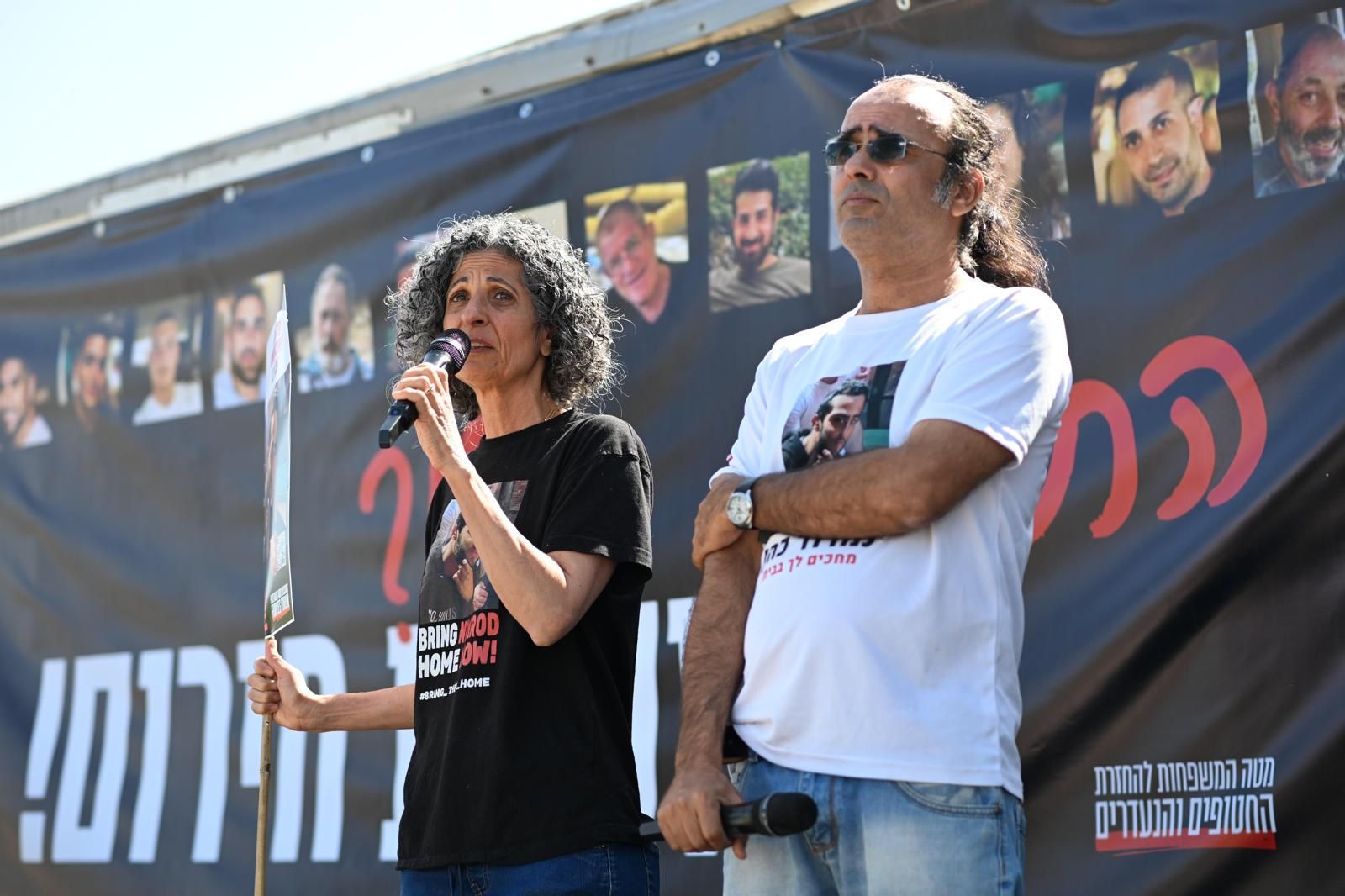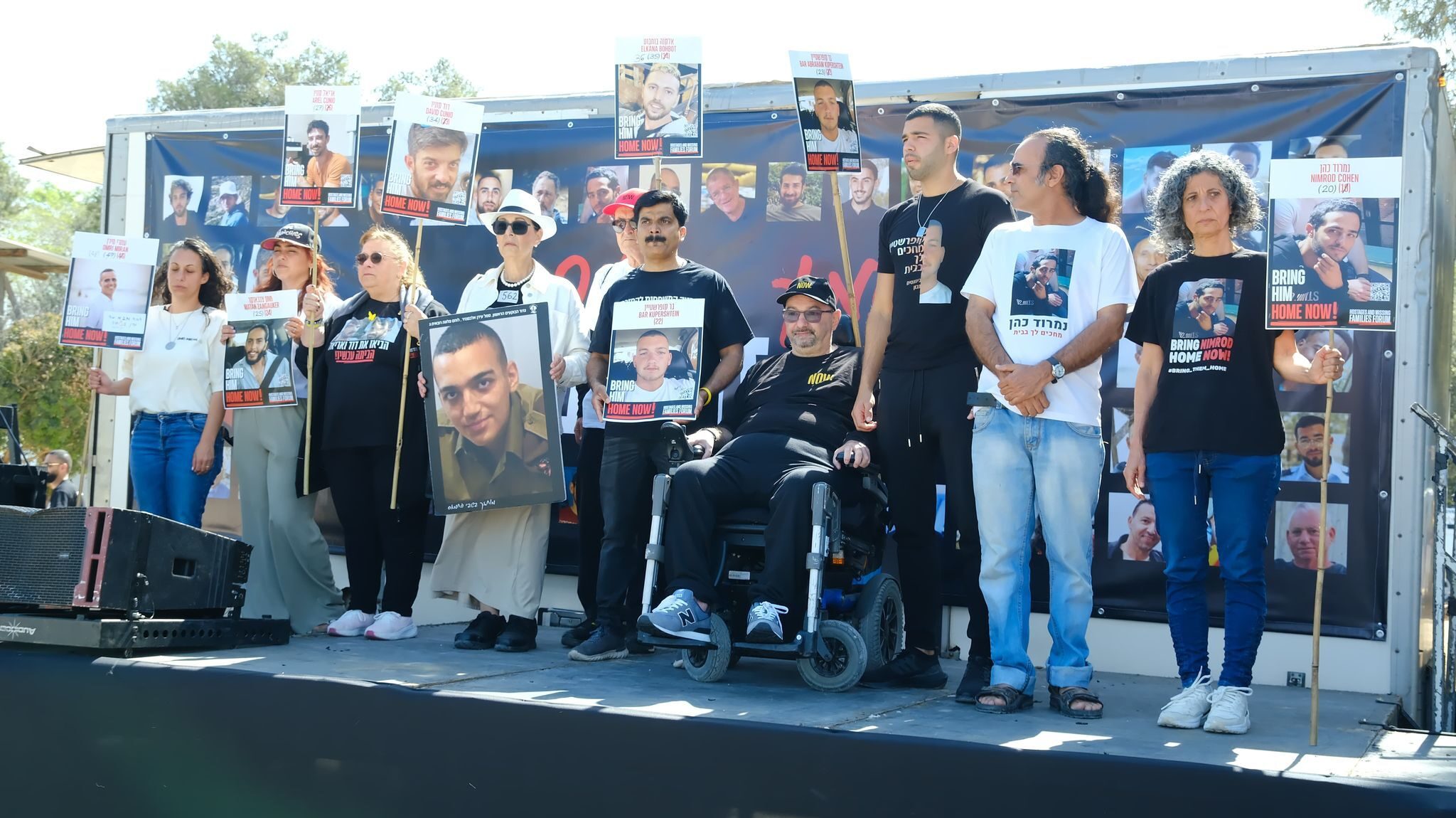‘Hamas Has Done Its Homework’: How Psychological Warfare Exploits Israeli Fault Lines
Hamas’ latest hostage video of Elkana Bohbot deepens Israel’s internal rift: families of captives plead for a deal, while some argue protests empower Hamas
Hours before Israeli protestors gathered for their weekly anti-government demonstration, Hamas dropped a promo of a hostage video it intended to release on the Telegram social media and messaging platform.
“Time is running out…” the ominous text on the screen appeared, with a pixelated face of an Israeli hostage sobbing in the background. Later, as thousands of Israelis were already protesting, the full four-minute harrowing video of Elkana Bohbot was posted on Telegram.
In the video, Bohbot was conducting a mock phone call with his wife. He said he was afraid to die, begging to see his 4-year-old son.
“I have no more energy,” he sobbed. “I have heard that they are signing petitions to stop the war and release us.” The frail and distraught Bohbot was referring to the recent wave of contentious petitions signed by Israeli military reservists and former senior officers calling for a hostage deal and an end to the war.
One of the most heated debates in Israeli history is now at its peak. Military service, once considered a consensual topic, has become a tool in the debate on the fate of the hostages.
The hostages are being used as part of the demonstrations to topple the government.No one asked for our permission, and every single demonstration and petition gives Hamas the power and the pleasure to see Israeli society crumbling from within.
“The hostages are being used as part of the demonstrations to topple the government,” Tal Gilboa, whose nephew Guy Dalal is being held by Hamas after attending the Nova music festival near the Gaza border, told The Media Line. “No one asked for our permission, and every single demonstration and petition gives Hamas the power and the pleasure to see Israeli society crumbling from within.”
But for Vicky Cohen, the mother of Nimrod Cohen, a soldier also being held by Hamas for the past 562 days, the demonstrations are a source of strength.
I would demonstrate with or without these videos. The struggle is the same struggle, but the videos have a greater impact on the public. This struggle is a legitimate one. Our government has abandoned the hostages, and we cannot allow for this reality to happen.
“I would demonstrate with or without these videos,” she told The Media Line. “The struggle is the same struggle, but the videos have a greater impact on the public. This struggle is a legitimate one. Our government has abandoned the hostages, and we cannot allow for this reality to happen.”
On Sunday, just hours after Bohbot’s heartbreaking appeal, relatives of hostages gathered along the Gaza border to call out to their loved ones. Vicky was one of those at the border. The first sign of life she received from her son was when a video of other hostages was released and they recognized Nimrod’s tattoo in the video, although his face was not shown.

Vicky and Yehuda Cohen (Lior Rotstein)
“It was horrifying to see,” Cohen said. “I was both excited to get a glimpse but also overwhelmed with immense concern for his well-being. Seeing these videos of them begging for their lives is just heartbreaking.”
According to polls conducted by the Israel Democracy Institute throughout the war, a steady increase in support for a deal that would see the end of the war and the release of the hostages occurred, the longer the war lasted. It is important to note that it is unclear whether Hamas would agree to release every single hostage, as they have proven to be not only an asset but an insurance policy for its survival and ability to pressure Israel.
This holiday season, give to:
Truth and understanding
The Media Line's intrepid correspondents are in Israel, Gaza, Lebanon, Syria and Pakistan providing first-person reporting.
They all said they cover it.
We see it.
We report with just one agenda: the truth.


We need the public, it strengthens us, and it would be very hard to undertake this struggle alone.
“We need the public, it strengthens us, and it would be very hard to undertake this struggle alone,” said Cohen.
The sentiment is not shared by all, and it is a rift that, according to experts, Hamas is looking to engorge.
Hamas recognizes the current discourse and is leveraging it. Psychological warfare targets the public and not the government, in order to create pressure from the ground up.
“Hamas recognizes the current discourse and is leveraging it,” Yaniv Levyatan, PhD., an expert in information warfare, told The Media Line. “Psychological warfare targets the public and not the government, in order to create pressure from the ground up.”
“If you are so worried about the hostages – shut up!” said Gilboa. “Our greatest personal disaster has become everyone’s property. We are so scared for the fate of our loved ones; any word could harm them. It has nothing to do with political opinions – just shut up!”
Hamas skillfully continues to employ psychological warfare aimed at the Israeli public, as part of its ongoing war against the Jewish state.
Bohbot is one of the 59 hostages that remain in the hands of Hamas in the Gaza Strip. At least 35 of them are believed to be dead. Negotiations to secure the release of at least some of the living hostages appear to be stalled. Efforts by Steve Witkoff, the American Special Envoy to the Middle East, have so far failed. Staged and scripted, part of Bohbot’s appeal was in English, aimed at attracting international attention. He urged a friend to take his wife to the White House to appeal to US President Donald Trump.
From this, one can deduce what messages they want to convey, both in the text and the subtext. If they ask to stop the bombings or renew humanitarian aid, we can conclude what is harming Hamas.
“The script is written in advance and has a goal,” Dr. Ron Schleifer, a researcher on psychological warfare from the School of Communication at Ariel University, told The Media Line. “From this, one can deduce what messages they want to convey, both in the text and the subtext. If they ask to stop the bombings or renew humanitarian aid, we can conclude what is harming Hamas.”
What we are seeing is basically a one-sided correspondence with very precise messaging both to the public and to the Israeli government.
“What we are seeing is basically a one-sided correspondence with very precise messaging both to the public and to the Israeli government,” said Schleifer, also the author of ‘Post psychological warfare.’ “Hamas carefully watches the developments in Israel and uses psychological warfare in synchronization with physical warfare. Currently, their ability to engage in physical warfare is under duress, so they are increasing their psychological warfare.”
Last week, the Palestinian Islamic Jihad also released a video, which was the first sign of life from another hostage, Rom Braslavski.
“It’s really not that complicated,” said Gilboa. “Hamas makes requests, and the Israeli public meets the demands. Then Hamas hunkers down in its position.”
“Our government needs to do everything in its power to get the hostages back, and this means stopping the war. Hamas hasn’t budged from this position since the beginning of the war,” said Cohen.
Hamas stunned Israel on October 7, 2023, when it launched a surprise offensive during which it killed approximately 1200 Israelis and kidnapped over 250 people. The remaining hostages remain one of Hamas’ main pressure points against Israel, after the latter launched an unprecedented war against the Gaza Strip, dealing a massive blow to the terrorist organization and the civilian population in the territory. Throughout the attempts to negotiate the release of hostages, Hamas has maintained its position that Israel must end the war effort and withdraw all of its forces from Gaza.
The video released by Hamas over the weekend was the last in a series of videos released in recent weeks as efforts to negotiate a settlement continued. There has been an uptick in the videos as the stakes of the negotiations are higher. Hamas is looking to secure the end of Israel’s war against it. Israel wants to secure the release of all of its hostages while ridding Hamas of its ability to rule the Gaza Strip. It is difficult to see where the two rivals will be able to find a middle ground to end the bloody conflict between them.
“It is impossible to predict what Hamas will do, but we are already seeing an increase in the frequency, and it is likely we will see a further increase,” Levyatan said. “There were lengthy periods during the war in which videos were not released. We are seeing less fighting, less emergence of fighters to engage in warfare above ground, and are employing more psychological weapons.”
After a temporary ceasefire at the beginning of the year, during which 38 hostages were released, Israeli troops have reentered the Gaza Strip in recent weeks, renewing the fighting. According to the Hamas-run Gaza Health Ministry, 51,000 Palestinians have been killed by the Israeli military since the beginning of the war, with over 116,000 people injured. United Nations (UN) data suggests the majority of houses in Gaza have been destroyed, with almost two million residents internally displaced. Since October 2023, and almost with no interruption, the Israeli military and all of its arms have been pounding Gaza relentlessly.
“Hamas, as a fighting power, is inferior to Israel in almost every parameter,” said Levyatan. “Psychological warfare is one of the leading weapons in its arsenal, and its abilities are not to be underestimated in this arena. When Hamas wants to attack Israeli society, it can choose between firing missiles and firing psychological missiles. While Israel has aerial defense systems that can thwart most missile attacks, the Israeli society finds itself targeted and taking substantial hits from Hamas’ psychological warfare.”
“Hamas knows what narrative and which symbols to use in order to hurt Israeli society,” Levyatan added.
Hamas has done its homework carefully. Guerrilla organizations are usually much quicker at drawing conclusions than states are.
“Hamas has done its homework carefully,” said Schleifer. “Guerrilla organizations are usually much quicker at drawing conclusions than states are.”
The hostage crisis, the largest Israel has ever faced, threatens to tear Israeli society apart. Those who favor a deal are often aligned with the opposition to the government. They see an Israeli agreement to end the war as the only way to secure the release of the hostages. The current government and its supporters believe Hamas needs to be under significant military pressure in order to succumb to a deal.
Hamas’ surprise offensive not only caught Israel off guard, but it also hit at a delicate time in which Israeli society was experiencing a growing rift. Torn between anti-judicial reform protests and government supporters, Israelis were briefly united following the attack. The lengthy war effort allowed for the gradual resurfacing of the cracks and opened up a historic debate of the price Israel should or should not pay to secure hostages. Previous deals saw the release of thousands of Palestinian prisoners, another sore spot for many Israelis whose loved ones were killed in terrorist attacks perpetrated by those who regained their freedom through deals.
“Hamas’ psychological warfare is successful by raising many questions that already exist in the public discourse,” said Levyatan. “But on the other hand, the attack by Hamas showcased Israeli society’s ability to bounce back, showing unprecedented resilience.”
As reports about a recent Israeli proposal shot down by Hamas emerged over the weekend, the status of the negotiations is unclear, leaving room for more psychological warfare in the interim.

